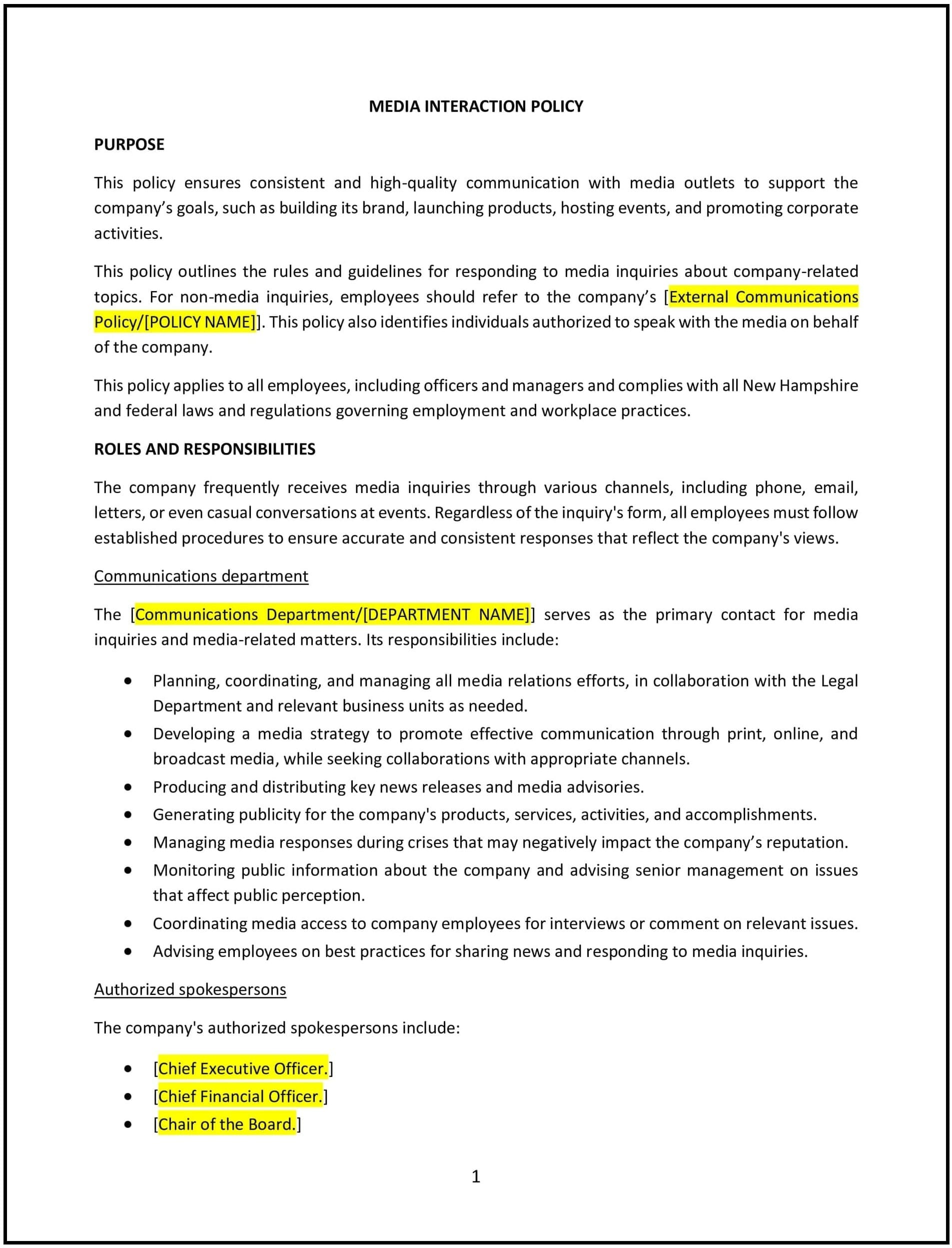Media relations policy (New Hampshire): Free template
Got contracts to review? While you're here for policies, let Cobrief make contract review effortless—start your free review now.

Customize this template for free
Media relations policy (New Hampshire)
A media relations policy helps New Hampshire businesses manage their interactions with the media, providing clear guidelines on how employees should handle media inquiries and public statements. The policy outlines who is authorized to speak on behalf of the company, the process for managing media interactions, and how to maintain the company’s reputation in the public eye.
By adopting this policy, businesses in New Hampshire can maintain consistent messaging, protect their brand reputation, and ensure that media relations are handled professionally and in alignment with company values.
How to use this media relations policy (New Hampshire)
- Define authorized spokespersons: Specify who within the company is authorized to speak with the media, such as the CEO, communications manager, or other senior leaders, and outline the protocol for media inquiries.
- Outline media inquiry procedures: Set clear procedures for handling incoming media inquiries, including directing journalists to the designated spokesperson and providing guidelines on how to respond to questions.
- Emphasize confidentiality and discretion: Remind employees of the importance of confidentiality and the need to avoid sharing sensitive or proprietary company information with the media without proper authorization.
- Establish guidelines for public statements: Provide guidelines for making public statements, including how to craft official responses and press releases, ensuring that the company’s messaging is aligned and consistent.
- Promote transparency: Encourage transparent communication with the media while protecting the company’s interests and reputation. Clarify the boundaries between what can be shared publicly and what should remain confidential.
- Address crisis communication: Outline the procedures for managing media relations during a crisis or sensitive situation, including designating key spokespeople and preparing pre-approved statements or talking points.
- Monitor media coverage: Establish a process for tracking media coverage and ensuring that any inaccuracies or negative portrayals are addressed in a timely and appropriate manner.
- Review and update: Regularly review and update the policy to reflect changes in the media landscape, company operations, or any legal or regulatory requirements regarding media interactions.
Benefits of using this media relations policy (New Hampshire)
This policy provides several benefits for New Hampshire businesses:
- Maintains brand consistency: By providing clear guidelines for media interactions, businesses can ensure that all media communications are consistent with their values, messaging, and public image.
- Protects company reputation: The policy helps protect the business from negative publicity, misinformation, or misunderstandings by ensuring that responses to the media are carefully managed and aligned with the company’s best interests.
- Improves crisis management: A well-defined media relations policy enables businesses to manage media interactions more effectively during times of crisis, ensuring that the right information is communicated to the public in a controlled and measured manner.
- Increases media effectiveness: By designating spokespersons and establishing clear communication protocols, businesses can enhance the efficiency and impact of their media outreach, maximizing opportunities for positive press coverage.
- Promotes transparency and trust: By fostering open and honest communication with the media, businesses can build stronger relationships with journalists, media outlets, and the public, promoting transparency and trust.
Tips for using this media relations policy (New Hampshire)
- Communicate the policy clearly: Ensure that all employees are aware of the company’s media relations policy, especially those in communication or public-facing roles, so they understand their responsibilities and the proper channels for media inquiries.
- Train employees on media interactions: Offer training for employees who may engage with the media, covering best practices for responding to questions, maintaining confidentiality, and handling difficult or sensitive situations.
- Be proactive in media outreach: In addition to handling incoming inquiries, businesses should actively build positive relationships with the media through regular outreach, press releases, and proactive media engagements.
- Monitor media coverage regularly: Track media coverage of the company to stay informed about how the business is being portrayed, and respond promptly to any inaccuracies or negative portrayals.
- Prepare for crises: Have crisis communication plans in place, including pre-written statements and designated spokespersons, to ensure that media interactions during a crisis are handled efficiently and professionally.